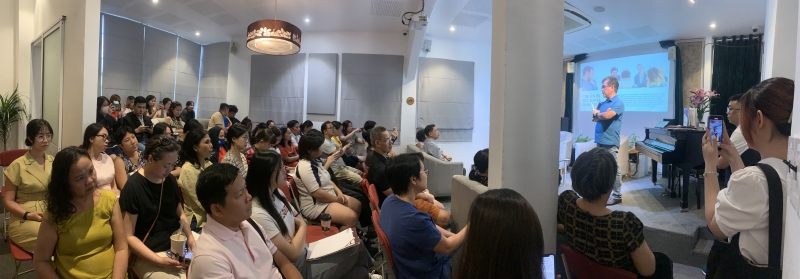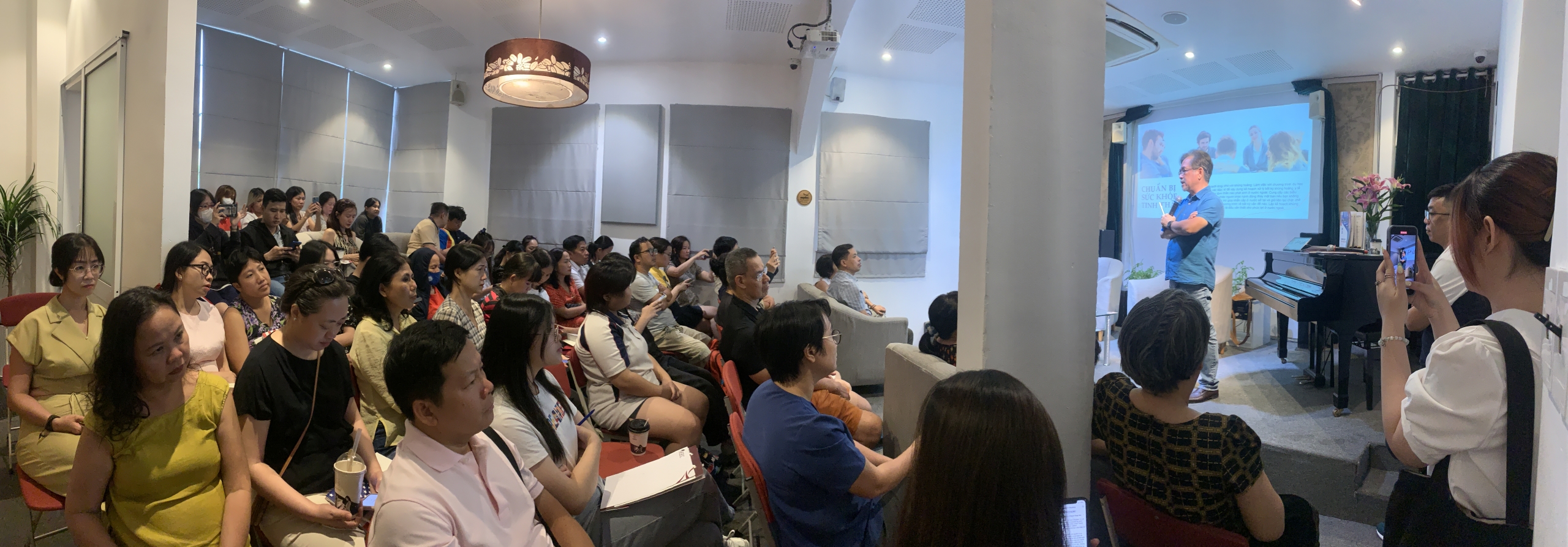1. Time and Venue
- Time: 14:30 – 17:30 SATURDAY AFTERNOON, 17.06.2023
- Venue: Saturday Coffee Culture Salon – 79A Phan Kế Bính, Đa Kao Ward, District 1, HCMC
2. Speakers
- Dr. Lê Nguyên Phương: Dr. Lê Nguyên Phương holds a Master’s degree in Educational Psychology and School Psychology from California State University, Long Beach, and a Ph.D. in Educational Leadership and Educational Psychology from the University of Southern California, USA. With over 18 years of experience as a School Psychology expert in large school districts in California, USA, he evaluates, consults, and intervenes for children from preschool to 12th grade. He also teaches in the Master’s programs in Psychology and School Counseling at California State University, Long Beach, and Chapman University.
- Expert Bung Trần: Currently the President of NEEC Education, Chairman of AI Education group, and the first Vietnamese lecturer of Google for Education. He is also a lecturer at AWS Academy under Amazon and Vice President of Saigon Innovation Hub.

3. Event Content
Expert Bung Trần: Recently, when consulting for some parents, Bung realized their anxiety when their children are about to study abroad. Parents are fearless when it comes to trying new things, but when it comes to letting their children do something on their own, their anxiety becomes enormous. Therefore, preparing the mindset and psychology for parents and students before studying abroad is extremely important. This is why Bung invited Dr. Lê Nguyên Phương to this seminar to talk and advise parents and students.
Dr. Lê Nguyên Phương: When preparing for their children to study abroad, parents often prepare financially and academically but do not prepare psychologically. The foreign environment is completely different from Vietnam, and thus preparing the psychology for students and parents is even more important than money and academic performance. Firstly, the educational methods abroad will differ, and many schools accept students with average academic performance but invest in top professors and lecturers to ensure their students graduate on par with other universities. The entry is easy, but the exit is tough. Your child will be happy if you thoroughly prepare the following factors and help them succeed abroad.
Regarding language preparation, students should learn the basic knowledge of the local language, such as common phrases, greetings, and questions they will use daily. Did you know that for conversational English, we can set three different levels:
- Formal: used primarily in academic settings, official documents, and government paperwork.
- Informal: used with friends, and teachers after class.
- Colloquial language: everyday communication with close friends and family.
And there’s a type only used “on the street,” called “slang.” The hardest yet most important part is understanding and integrating into that culture to be ready for the journey abroad.
- First, improve your listening skills by listening to music, podcasts, or audiobooks. Try to understand as much as possible to train your listening skills. This way, you can also expand your vocabulary and understand how words are used in context.
- To best prepare for conversational language, students need to immerse themselves in the language, practice daily through applications, or follow social media accounts, YouTube channels, TV shows, or movies. Immerse yourself as much as possible to get used to pronunciation, slang, and cultural references.
Next is to prepare your cognitive abilities. Develop critical thinking skills by learning to objectively analyze information and form your judgments.
- Critical thinking will help you navigate cultural differences. Enhance your ability to view issues from multiple perspectives: Try to understand issues from different cultural and social viewpoints. Look at problems from different angles and understand others’ perspectives. This ability is key to navigating multicultural situations.

- Learn to adapt to changes and step out of your comfort zone. Adaptability is crucial for integrating into a foreign environment with different cultural norms and expectations. Be willing to question your beliefs and perception frameworks and be open to different ways of thinking. An open and curious mindset will allow you to appreciate cultural differences and make the most of experiencing a new culture.
Thirdly, prepare a support community for the students. Build a network of close friends and family to protect yourself, as this place is not paradise. Protect yourself from racial discrimination issues.
- Connect with your closest friends and family members before going abroad. Let them know your plans and how they can support you remotely.
- Talk to others with experience abroad: Seek people in your community who have studied or lived abroad. Ask them for advice and guidance to help you prepare. They can also provide support while you are abroad.
- Research resources at your destination: Learn about social and support groups for international students and expatriates at your destination. Connect with some online groups beforehand and plan to join them in person once you arrive. They can help ease the transition to life abroad.
The fourth and most crucial factor is to prepare your mental health. When studying abroad, the likelihood of students experiencing mental health issues is relatively high, although not all students will face such situations. However, feeling down, depressed, or exhausted is natural when going to a foreign country with a completely different culture and without family by your side.
- Establish routines to maintain your health, such as exercising, eating balanced meals, limiting alcohol/caffeine intake, and getting enough sleep. Healthy self-care will boost your mood and ability to handle challenges.
- Build emotional resilience: Learn coping strategies to navigate difficult emotions and setbacks. Practice self-compassion, optimism, and view failures as learning opportunities. Resilience is key to adapting to life abroad.
- Discuss mental health: Talk to your doctor about how your mental health might be affected abroad and preventive measures to take. Seek advice on self-care strategies to maintain your well-being. Know how to access crisis help in emergencies. Don’t hesitate to use counseling services if needed during your time abroad.
- Plan activities to engage your mind: Physical and mental health are almost one unified entity, so maintaininga regular lifestyle also keeps your mind in the best state. Think about activities that can engage your mind, such as volunteering, clubs, sports, music, religion, or arts. Engage in similar activities abroad to maintain social connections and combat feelings of isolation or boredom.
- Be aware of Seasonal Affective Disorder (SAD): If moving to a place with limited sunlight, guard against this disorder with light therapy, outdoor activities, and a balanced diet and exercise. Talk to your doctor about whether medication is appropriate before you leave. Awareness and prevention of SAD will support your mental transition abroad.
The fifth is to prepare self-reliance and adaptability. Equip students with basic life skills to practice in daily life.
- Learn basic cooking skills: Practice cooking simple, healthy meals to prepare for your life abroad. Research cooking techniques and watch videos on making staple dishes of the local cuisine at your destination. Cooking for yourself will save money and avoid unhealthy eating habits.
- Practice doing laundry: Familiarize yourself with washing your clothes, including using a washer and dryer or hand-washing clothes. Know the basic guidelines for sorting and using detergents to care for your clothes properly abroad without damage.
- Consider learning to drive: If living in a place with limited public transportation, learn to drive and obtain an official driver’s license before leaving. Know how to handle a vehicle in emergency situations and different road conditions. Obtain an International Driving Permit to legally drive abroad.
- Develop problem-solving skills: Take opportunities to solve problems independently to strengthen your ability to work independently in challenging situations. Develop solutions for issues like technological malfunctions, schedule conflicts, and disputes with others.
- Recognize that homesickness is normal and have coping strategies ready when it arises. Actively engage with your new environment, connect with social support, and remember the reasons why you wanted to go abroad. Overcoming homesickness will help you transition to an independent mindset.
Finally, prepare for cultural integration. We live in a multicultural community, even if we only live within the Vietnamese community; outside, we still engage with a multicultural world.
- Research cultural values and expectations: Learn about the cultural values and social norms of your destination country. Understand differences in concepts such as personal space, punctuality, and gender respect. Respect the host culture and adjust your behavior accordingly.
- Observe cultural etiquette: Research appropriate etiquette related to greetings, dining, dressing, relationships, and especially behavior in the classroom. Practice etiquette beforehand to avoid misunderstandings and awkward situations abroad. Etiquette varies widely across cultures.
- Learn about daily life rhythms: Research how daily life unfolds in your destination country, including work schedules, holiday times, transportation options, and dining habits. Knowing the daily rhythms will help you transition abroad by setting appropriate expectations for how life will proceed.
For example, in the US, I have learned that “You should not call for work after 8 pm, or even after 5 pm, and only call during working hours. On Saturday mornings and Sundays, you shouldn’t call before 10 am.” This is because it is rest time, family time, and it is extremely important in the US.
- Be aware of cultural conflicts and discrimination: Be aware and learn about discrimination at various levels in study and living environments in the country you are studying in, especially with racist groups or gangs. Proactively avoid conflict situations and know how to protect yourself.
Event Conclusion
At the end of the seminar, parents and students discussed and asked questions for Dr. Lê Nguyên Phương, and the event concluded at 17:00 on the same day.

Bạn đã sẵn sàng để du học?
NEEC là đối tác và hỗ trợ lộ trình du học, nộp hồ sơ vào các trường Trung Học - Đại Học hàng đầu nước Mỹ, Canada
Liên hệ ngay Hẹn tư vấn



